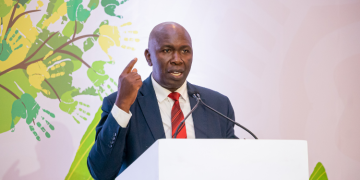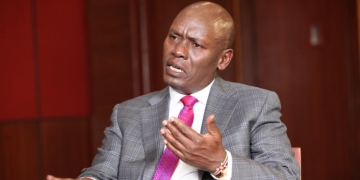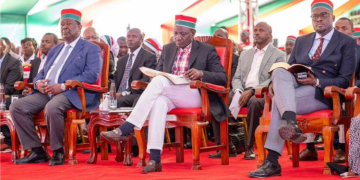President William Ruto is facing another court battle over the Affordable Housing Act which he signed into law on Tuesday, March 19, 2024.
Five petitioners have moved to court seeking conservatory orders to stop the implementation of the act citing it as irregular, irrational, and illegal.
In a petition filed at the Milimani Law Courts, Dr Benjamin Magare Gikenyi argued that the tax is unreasonable, unconstitutional and condemns workers to service mortgages for unknown houses they don’t need and will never own.
Gikenyi says act does not recognize that some Kenyans have houses while employers are required by law to provide accommodation to their staff.
“Some of the employees already own houses or are servicing mortgages, or they live in staff houses provided by their employers or earn housing allowances paid by their employers,” the petition read in part.

“Employers are already under a legal obligation to provide accommodation to their employees or to pay sufficient money as rent, in addition to wages or salary paid.”
Besides, Gikenyi said the levy is unfair, unreasonable, and unnecessary since taxpayers are already struggling with mortgage payments.
He further argued that the law, “tries to introduce communist ideologies yet, there is nowhere in the Constitution which allows government to introduce communist ideologies.”
“Imposing a housing levy in addition to the obligation imposed by Section 31 of Employment Act, 2007, will amount to a gross violation of the national values and principles of governance under Article 10,” he argued.
Other Allegations Ruto is Facing in the New Petition
The petitioners also said the law will subject citizens to servitude contrary to Article 25(b) which is explicit that freedom from servitude is a non-limitable right.
According to Gikenyi, the law will lead to inter loss of public confidence and outright abuse of political power to the detriment of many Kenyans.
“For all practical purposes, the fund subject employees and other income earners to cruel, inhuman and degrading treatment, which is tantamount to servitude,” he said.
He stated that it was unconstitutional that the Act purports to use public land pursuant to the Land Act, 2012 and sell the housing unit to a private individual or corporate.
“Even those people who will get houses, they will not be allowed to sell until the board agrees with it that in itself is unconstitutional,’ he said.
Also Read: High Court Dismisses Petition Challenging Housing Bill
Additionally, he claimed that the fund’s establishment was not based on the law making it “a private fund that is being funded by public resources”.
He listed Cabinet Secretaries for Lands and Treasury, the Attorney General, the National Assembly and the Senate as the respondents.
The Act was passed by the National Assembly with amendments on February 21, and by the Senate on March 12, 2024.
Employers and employees will remit a deduction of 1.5% from their monthly salaries in the new law.
Also Read: Kenyans to Pay More for Fuel as Govt Raises EPRA Levy
Court Declares Housing Levy Illegal
On January 26, the Court of Appeal upheld the decision by the High Court declaring the levy unconstitutional forcing the government to take it back to the drawing board.
A three-judge bench ruled that the levy was introduced without a legal framework.
However, the government has argued that the suspension provided room for restructuring the bill and now provides a new legal framework for the levy.










































































